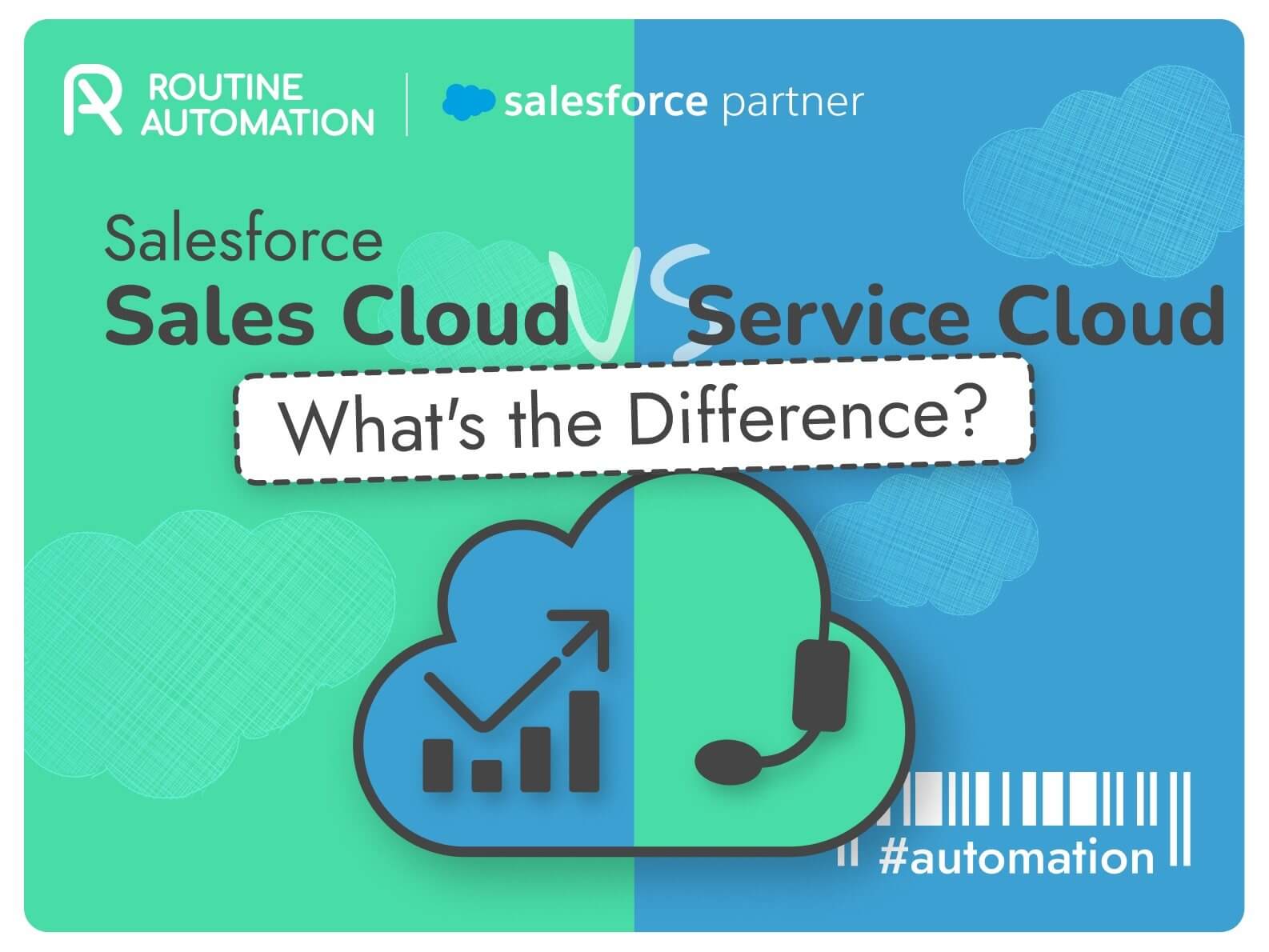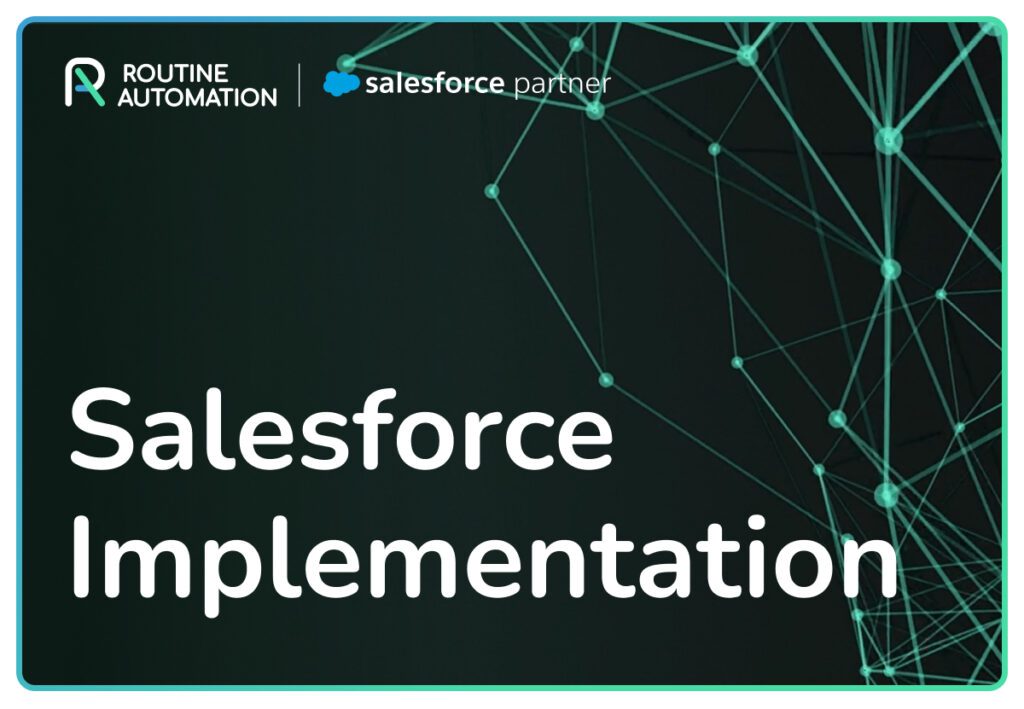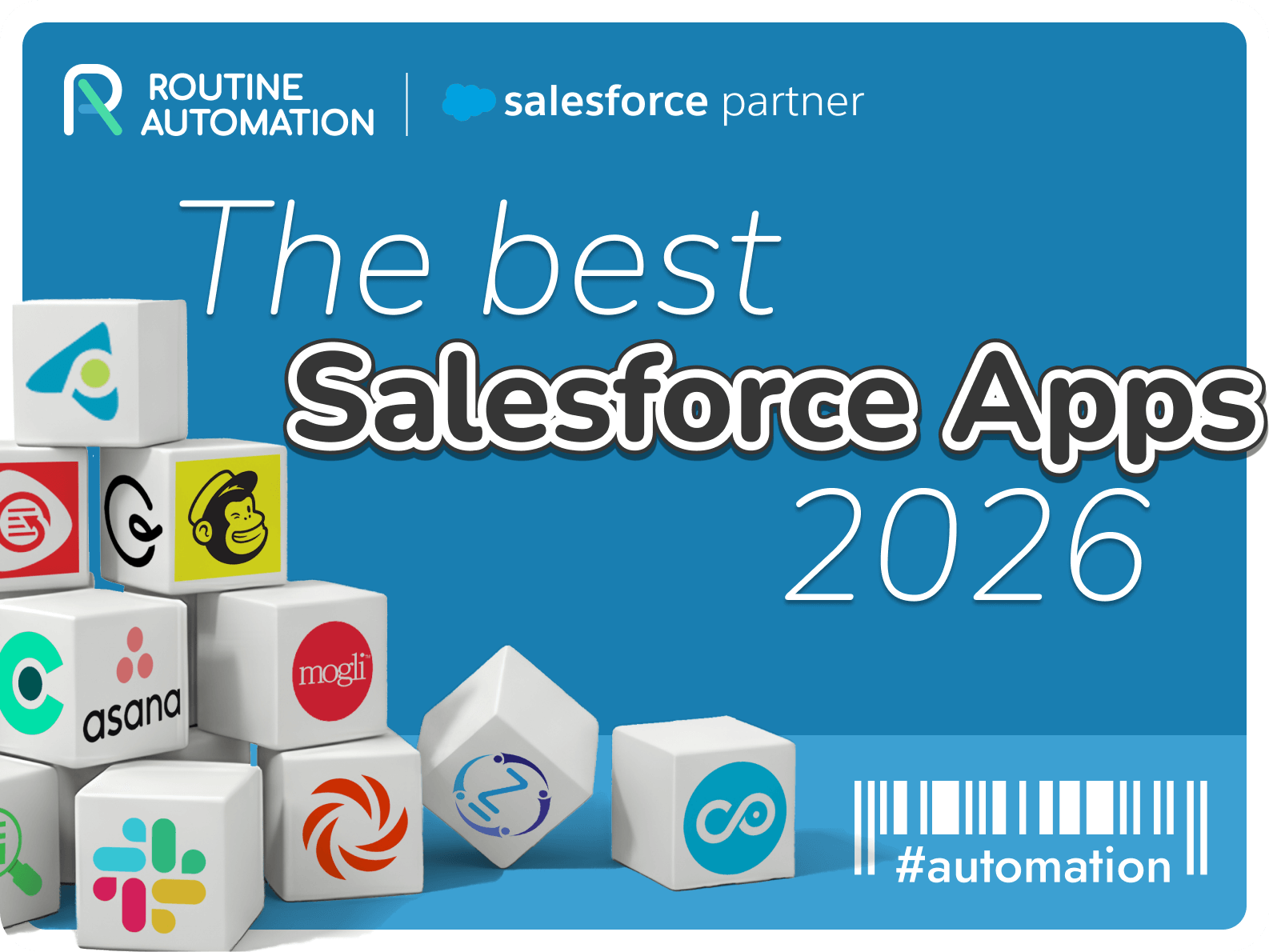Salesforce Sales Cloud vs Service Cloud: What’s the Difference?

When exploring customer relationship management (CRM) solutions, two popular options within the Salesforce ecosystem stand out – Sales Cloud and Service Cloud. But what exactly is the difference between Salesforce’s Sales Cloud and Service Cloud offerings?
In this comprehensive guide, Routine Automation experts compare Salesforce Sales Cloud vs Service Cloud, outlining the key features and use cases of each to help you determine the best choice for your business. Read on to gain clarity on where these powerful CRM platforms overlap and where they diverge so you can leverage the right solution to meet your specific sales and service needs.
What are the Sales Cloud and Service Cloud Difference?
While Sales Cloud and Service Cloud share the same core Salesforce platform and certain functionalities, they serve distinct purposes tailored to different departments and processes.
Salesforce Sales Cloud focuses on sales teams, providing tools to optimize workflows for capturing leads, managing accounts and contacts, closing deals, forecasting, and reporting on sales performance. It empowers reps and managers to work efficiently and hit their targets.
Salesforce Service Cloud focuses on support and service teams, arming agents with capabilities to deliver top-notch customer experiences. Key features resolve issues quickly, route cases intelligently, and provide relevant knowledge – all while tracking service metrics.
At a high level, the Sales Cloud facilitates sales while the Service Cloud facilitates service and support. But there are also overlapping features between the two solutions for a unified view of customer interactions. Our team of experts can help you determine the right solution or combination to align with your business priorities.
What is Salesforce Sales Cloud?
Salesforce Sales Cloud is a customer relationship management platform designed for sales teams to optimize their workflows and operations. As a core Salesforce solution, Sales Cloud helps businesses manage the entire sales process more efficiently – from generating and scoring leads to closing deals and forecasting.
Salesforce Sales Cloud Overview Demo
With Sales Cloud, sales reps gain a centralized hub to:
Key capabilities include lead, opportunity, and pipeline management, sales automation, customizable reports and forecasts, and tools for sales collaboration and productivity. Mobile access further empowers teams with on-the-go CRM.

Overall, Salesforce Sales Cloud aims to help sales teams work smarter, convert more leads, and exceed revenue targets through streamlined processes and visibility powered by timely CRM data. The RA team can assess your sales workflows and processes to determine if Sales Cloud is the right fit.
What is Salesforce Service Cloud?
Salesforce Service Cloud is a CRM platform tailored for customer service and support teams. It provides agents with an integrated set of tools to deliver fast, personalized service across every channel – phone, email, chat, social media, and more.
With Service Cloud, agents can:
Key features include omnichannel support, intelligent case routing, knowledge management, service console, automation, and analytics. By consolidating tools and data, Service Cloud aims to improve agent productivity, customer satisfaction, and first-call resolution.
What is Salesforce Cloud? (Video)
Our consultants can help you determine if Service Cloud has the capabilities needed for your customer service workflows and use cases. We can also integrate it with other systems to create a comprehensive service solution.

Sales Cloud vs Service Cloud Comparison
While Sales Cloud and Service Cloud serve different primary functions, they have some overlapping capabilities as they are both built on the Salesforce platform.
Here is an at-a-glance comparison of Salesforce Sales Cloud vs Service Cloud:
| Sales Cloud | Service Cloud | |
| Focus | Sales teams | Support teams |
| Purpose | Optimizing sales workflow and processes to boost revenue | Optimizing service workflow and processes to improve customer satisfaction |
| Key Users | Sales reps, sales managers | Service agents, support managers |
| Main Features | Lead, contact and opportunity management. Sales automation. Forecasting, pipeline and analytics. | Case management. Omnichannel support. Knowledge base. Service console. Automation and analytics. |
| Use Cases | Managing leads and accounts. Closing deals faster. Tracking sales performance. | Resolving customer issues quickly across channels. Improving agent productivity. Gaining service insights. |
While they have some differences in focus, Sales Cloud and Service Cloud can be integrated or bundled together for greater consistency, data sharing, and a 360-degree customer view across sales and service teams.
Our Salesforce specialists can help you determine the right solution for your business needs after assessing your workflows, teams, and objectives.

Key Features of Sales Cloud and Service Cloud
Sales Cloud and Service Cloud have some overlapping core platform features, but also provide unique capabilities tailored to their specific focus of sales versus service.
Key Features of Salesforce Sales Cloud
Here are some of the key features that enable Sales Cloud to facilitate sales workflows:

Key Features of Salesforce Service Cloud
Here are some of the key features that enable Service Cloud to facilitate support workflows:

For many businesses, a combination of key features from Sales Cloud and Service Cloud can prove powerful in optimizing interconnected sales and service processes. Our team can conduct an in-depth evaluation of your workflows, objectives, and teams to propose the ideal solution.
Conclusion
While Salesforce Sales Cloud and Service Cloud share an underlying platform, their focus on enhancing either sales or service processes drives different features tailored to their use cases.
Sales Cloud provides sales teams with tools to capture leads, close deals faster, and hit their targets by tracking customer interactions and automating workflows.
Service Cloud provides support teams with tools to resolve issues quicker, improve agent efficiency, and deliver excellent omnichannel customer experiences through intelligent case management.
Determining the right solution comes down to your business priorities and use cases. In many cases, a combination of Sales and Service Cloud capabilities can optimize interconnected sales and service workflows.
With our Salesforce expertise, we can conduct a comprehensive assessment of your environment to propose the ideal solution or combination. Let us guide you in leveraging Salesforce’s full potential to enhance sales productivity, the customer experience, and operational performance across every touchpoint.

















